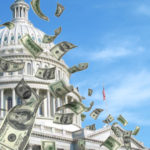The Taxaginia Total: $1.7 Billion in 2020
The four taxes I wrote about in “Taxaginia” last month could reach a combined fiscal impact of $1.7 billion by about 2020. In preparation for a talk (which I will not get to give today after all), I did a bit more digging and some additional information has since come out.
 The $611 million estimate for the state income tax hike resulting from conformity to federal tax changes is a Northam Administration estimate, known since summer.
The $611 million estimate for the state income tax hike resulting from conformity to federal tax changes is a Northam Administration estimate, known since summer.
The legislative money committee retreats last month produced a firmer estimate for the provider assessments (a.k.a. taxes) on private hospitals, with $719 million tagged as the revenue haul for 2020. (Don’t you wish you could develop a futures market on these estimates? That’s not going to hold.)
The Virginia Department of Taxation is now using $165 million as its projection of additional revenue once Virginia revises its sales and use tax to comply with the Wayfair decision and demand more tax collection by online merchants selling and shipping into the state.
The estimate on the carbon tax that will be imposed when Virginia joins the Regional Greenhouse Gas Initiative (RGGI) is a year old and is likely being revised as a new iteration of the regulation is considered. I’m using the number of $203 million, the upper range from last year’s Department of Planning and Budget estimate.
Under the newest version of the proposed regulation, electricity producers burning fossil fuels will need to pay for permission to emit 28 million metric tons of CO2, and the price per ton can only be estimated until the auction process gets underway. As it stands now, the plan is that all the money the utilities pay for their carbon rights will be returned to ratepayers somehow and not spike rates, but that mechanism is unclear.
Nobody Fights The Energizer Bunny
Not all the proposals Dominion Energy Virginia makes spark controversy. Proposed guidelines on planned pilot programs for utility-sized storage batteries have now cleared the State Corporation Commission. No objections were raised, no pile of testimony accumulated, and only a few tweaks were made to the original language.
One provision in the massive 2018 electricity regulation revision authorized Dominion to install up to 30 megawatts of storage, and Appalachian Power up to ten megawatts.
Another New Option for Customers Who Want Renewable
Also uncontroversial, but far more complicated, is a new choice offered to large electricity customers, the so-called Schedule RG tariff. This is a way for a Dominion Energy Virginia customer to buy exactly the kind of renewable power desired, but still remain under the umbrella of Dominion’s existing monopoly.
 Attorney Will Reisinger of the Richmond firm GreenHurlocker has written about the SCC’s approval of the new tariff on that firm’s blog. Limited to 50 large customers, it is designed to prevent any costs being borne by non-participating customers, in contrast to a recent solar project.
Attorney Will Reisinger of the Richmond firm GreenHurlocker has written about the SCC’s approval of the new tariff on that firm’s blog. Limited to 50 large customers, it is designed to prevent any costs being borne by non-participating customers, in contrast to a recent solar project.
Reisinger represented Mid-Atlantic Renewable Energy in the case, and other participants included Wal-Mart Stores and Sam’s East, Inc., possible customers for the new rate schedule. Your correspondent admits he has not plowed through the record but relies on Reisinger.
“Finally, it is important to note that Schedule RG was not approved under Va. Code § 56-577 A 5 and would not constitute a 100% renewable energy tariff under this statutory provision,” Reisinger wrote. “As we explained in our Regulatory Guide, this Code section authorizes any Virginia customer to purchase electricity “provided 100% from renewable energy” from non-utility suppliers, so long as the customer’s incumbent electric utility does not offer an SCC-approved tariff for 100% renewable energy.
“Therefore, if Dominion received approval to offer a 100% renewable energy tariff pursuant to Va. Code § 56-577 A 5, Dominion customers would lose their existing rights to shop for such energy.
“Currently, no Virginia utility offers an SCC-approved 100% renewable energy tariff. Dominion and Appalachian Power have both applied for approval to offer such tariffs, which thus far have been rejected.”
So that one chink in the utility monopoly remains.
And Finally, A Stunning Endorsement for Bacon’s Rebellion!
The following excerpt is from no less than Blue Virginia! It was part of a piece where Jim Bacon was attacked for being a damnable climate-denier, of course, and the Richmond Times-Dispatch was roundly condemned for hiring him, but it also included this:
Let’s be clear: Bacon’s Rebellion material is sometimes entertaining and, in some of the material, has a form of wonkiness that can be attractive/engaging for policy nerds. On its best days, it can provides (sic) valuable windows and thinking about policy interests with enough substance that can enable thoughtful engagement.

Leave a Reply
You must be logged in to post a comment.